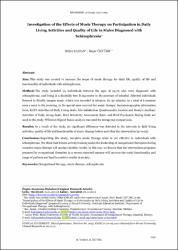Investigation of the Effects of Music Therapy on Participation in Daily Living Activities and Quality of Life in Males Diagnosed with Schizophrenia
Özet
Aim: This study was created to increase the scope of music therapy for daily life, quality of life and
functionality of individuals with schizophrenia.
Method: The study included 25 individuals between the ages of 25-75 who were diagnosed with
schizophrenia, and living in a disability-free living center in the province of Istanbul. Selected individuals
listened to Bûselik maqam music, which was recorded in advance, for 30 minutes, in a total of 6 sessions
once a week in the morning, in the special area reserved for music therapy. Sociodemographic information
form, KATZ Activities of Daily Living Scale, Life Satisfaction Questionnaire, Lawton and Brody's Auxiliary
Activities of Daily Living Scale, Brief Selectivity Assessment Scale, and Brief Psychiatric Rating Scale are
used in the study. Wilcoxon Signed Ranks analysis was used for intragroup comparisons.
Results: As a result of the study, no significant difference was detected in the intervals in daily living
activities, quality of life and functionality of music therapy before and after the intervention (p>0.05).
Conclusion: Regarding this study, receptive music therapy alone is not effective in individuals with
schizophrenia. We think that leisure activity training under the leadership of occupational therapists during
receptive music therapy will produce healthy results. In this way, we foresee that the intervention programs
prepared by occupational therapists in a person-centered manner will increase the social functionality and
range of patients and lead to positive results in society. Amaç: Bu çalışma, müzik terapinin şizofrenili bireyler üzerindeki günlük yaşam, yaşam kalitesi ve
işlevselliğe olan etkisi incelemek amacıyla yapılmıştır.
Yöntem: Çalışmaya engelsiz yaşam merkezinde yaşayan şizofreni tanısı almış 25-75 yaş aralığında olan 25
birey alınmıştır. Bireylere haftada bir gün sabah toplam 6 seans ve her seansta 30 dakika Bûselik makamı
dinletilmiştir. Çalışmada sosyodemografik bilgi formu, KATZ Günlük Yaşam Aktiviteleri Ölçeği, Yaşam
Memnuniyet Anketi, Lawton ve Brody’nin Yardımcı Günlük Yaşam Aktiviteleri Ölçeği, Kısa İşlevsellik
Değerlendirme Ölçeği ve Kısa Psikiyatrik Derecelendirme Ölçeği kullanılmıştır. Grup içi karşılaştırmalarda
Wilcoxon Signed Ranks analizi kullanıldı.
Bulgular: Çalışma sonucunda müzik terapinin günlük yaşam aktivitelerinde bağımsızlıkta, yaşam kalitesi
ve işlevsellikte müdahale öncesi ve sonrası anlamlı bir fark saptanmadı (p>0.05).
Sonuç: Yapılan çalışma sonucuna göre şizofrenili bireylerde reseptif müzik terapi tek başına etkili
olmamaktadır. Reseptif müzik terapi sırasında ergoterapistlerin önderliğinde serbest zaman aktivite
eğitimlerinin birlikte uygulanmasının etkili sonuçlar doğuracağı düşünülmektedir. Bu sayede
ergoterapistlerin kişi merkezli olarak hazırladıkları müdahale programlarıyla hastaların sosyal işlevsellik ve
bağımsızlık düzeyinde artış ve toplum bazında da olumlu sonuçlar doğuracağı ön görülmektedir.

















